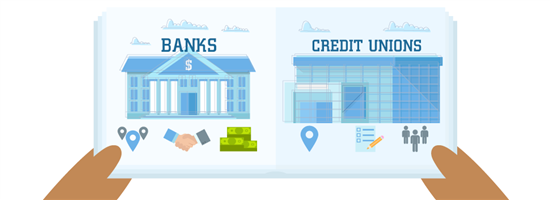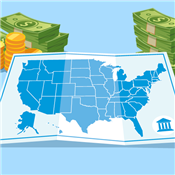Credit Unions vs Banks
Are credit unions better than banks? What's their major advantage? Take a look at the main differences before you join.
 |
| © CreditDonkey |
While many people understand the concept of a bank, credit unions might seem confusing.
Both banks and credit unions are financial institutions that accept deposits from customers and issue loans to borrowers.
Credit unions offer many of the same services as banks, such as checking, savings accounts and loans. You need to be a member to use a credit union. The first credit unions only allowed membership to groups who had something in common, such as where they lived or worked. Nowadays, the requirements to join are looser.
- Introduction
- What Are the Differences?
- Credit Union Pros and Cons
- Bank Pros and Cons
- Which Is Best for You?
- Best Banks and Credit Unions
What Are the Differences?
Credit unions and banks can both protect your money, but there are a handful of key differences to consider before setting up your account.
- Ownership
Banks are owned by shareholders who distribute the profits among themselves. Credit unions are member-owned, not-for-profit institutions that return profits to members leading to some big benefits that you'll learn about below. [1] - Membership
Credit unions typically have membership restrictions for joining that can be based on where you live or work. Banks will let most people join unless they have a history of late payments and overdrafts. - Regulation
Banks and credit unions also differ in how they are regulated.- Banks are regulated at both the state and federal levels. Their regulators include the Federal Deposit Insurance Corporation (FDIC) and Federal Reserve.
- Nationwide credit unions are regulated by the National Credit Union Administration (NCUA), and the remaining credit unions are regulated by state.
Are credit unions safe?
Yes, most credit unions offer the same protections that banks do. It's important to verify that your credit union is backed by the NCUA so that your money is insured. NCUA insurance provides the same coverage that banks receive from the FDIC. - Interest Rates
Credit union members share the institution's profits, so you can usually get a better interest rate on your savings account or loan. Here are the Credit Union and Bank Rates in Q2 of 2022:[2]Accounts & Loans Credit Unions (National Average Rate) Banks (National Average Rate) 5-Year CD w/ $10,000 1% 0.74% Checking Account w/ $2,500 0.07% 0.07% Savings Account w/ $2,500 0.09% 0.10% Credit Card 11.32% 12.35% 30-Year Fixed-Rate Mortgage 5.44% 5.32% New Car Loan - 48 months 2.90% 4.71% If you still want great interest rates at a bank, try online banks. They can save money by only operating virtually and usually pass those savings on to their members.
- Fees
Credit unions don't need to share profits with shareholders, so can usually offer lower fees. You'll usually find more credit unions that offer free checking accounts than banks.
However, your ATM fees might be lower at big banks. Since most banks offer free in-network ATM withdrawals and big banks have ATMs worldwide, you could more easily access your money.
- Locations
Credit unions might only have a few locations. This allows them to provide better customer service and could get to know you pretty well over the years. If you stay close to home, this personal service could be a big benefit.
Check the Credit Union Locator to see if there's one near you.
However, if you travel often, large banks have branches and ATMs worldwide, which might be a larger priority for you.
- Technology
Big banks can usually afford to invest in the latest financial technology for online banking. For instance, you may be able to easily transfer money using popular services like Zelle.
While credit unions' smaller budgets could mean you are forced to use older technology and have to travel to the physical branch to do more of your financial activities.
Credit Union Pros and Cons
Pros
- Better rates
- Because they are member-owned, credit unions usually charge lower rates for loans. They also tend to pay higher interest rates on checking and savings accounts.
- Lower fees
- Credit unions often offer free checking accounts without a minimum balance or service charge. You'll also pay less for overdrafts and bounced checks.
- Community focus
- Credit unions emphasize great customer service for their members. They'll often give back to the community through charity as well.
Cons
- Restricted membership
- Many credit unions will prevent you from joining if you don't meet certain membership requirements.
- Lack of insurance with some credit unions
- Not all credit unions carry NCUA insurance. Always verify that your credit union has deposit insurance so that your money is safe.
- ATM availability
- You may have a difficult time finding a surcharge-free ATM with a credit union since their ATM networks are usually smaller.
Credit unions have membership requirements. Oftentimes, the requirements are centered around where you work or live. If you don't meet those requirements, you can still join if you have a family member who's part of the credit union. You could also be eligible by donating to a specific charity.
Bank Pros and Cons
Pros
- Convenience
- Banks often operate more physical locations and have larger ATM networks where you can avoid ATM fees.
- Technology
- Big banks have a lot of resources. This makes them more likely to offer newer, convenient technology, like mobile deposit and Zelle®.
- More services
- Banks usually offer a greater variety of products and services, like retirement accounts and credit cards.
Cons
- Higher fees
- Shareholders, convenience, and technology come at a cost, and this means banks often charge higher fees than credit unions.
- Higher loan interest rates
- Banks want to make a profit, so they it makes sense for them to charge higher interest rates on loans.
- Shareholder-driven
- At the end of the day, banks answer to their shareholders, unlike member-focused credit unions.
Which Is Best for You?
Perhaps the idea of joining an organization and becoming a member appeals to you. You might also not like the idea of handing your money over to a for-profit institution. If so, a credit union is your best bet.
On the other hand, maybe the advanced services and latest technology that come with a bank matter more to you. If you prioritize convenience and easy access, banks have more branches and ATM locations.
When deciding, make sure that you pay attention to the fees and interest rates for the bank or credit union. Ultimately, it's your money and you'll want to make sure that you choose an institution that will help your financial journey.
Best Banks and Credit Unions
Banks
- Ally Bank
- Ally is an online-only bank that offers some of the highest deposit rates and lowest fees in the country.
- Chase
- Chances are that if you're visiting a city in the U.S., there's a Chase bank branch available. Chase boasts a large variety of credit card products with good rewards programs.
Credit Unions
- Alliant Credit Union
- Alliant Credit Union's online-only model serves those looking for a national credit union with lax membership requirements. Alliant's deposit rates on checking and savings accounts often exceed industry standards.
- Navy Federal Credit Union (NFCU)
- If you have ties to the army, NFCU could be a good option for you. They operate branches throughout the country and have a robust ATM network.
Bottom Line
These days, it's hard to avoid using the services of either a bank or a credit union. Whether you're looking for a credit card or seeking a mortgage, you'll have to choose one.
Credit unions offer a better return on your money with higher deposit rates and lower loan rates. Banks offer the latest technology and more convenience. It's important to weigh the pros and cons and choose the one that's best for your needs.
References
- ^ MyCreditUnion.gov What is a Credit Union?, Retrieved 8/10/2022
- ^ National Credit Union Administration Credit Union and Bank Rates 2022 Q2, Retrieved 8/10/2022
Write to Jeffrey B at feedback@creditdonkey.com. Follow us on Twitter and Facebook for our latest posts.
Note: This website is made possible through financial relationships with some of the products and services mentioned on this site. We may receive compensation if you shop through links in our content. You do not have to use our links, but you help support CreditDonkey if you do.
Read Next:






